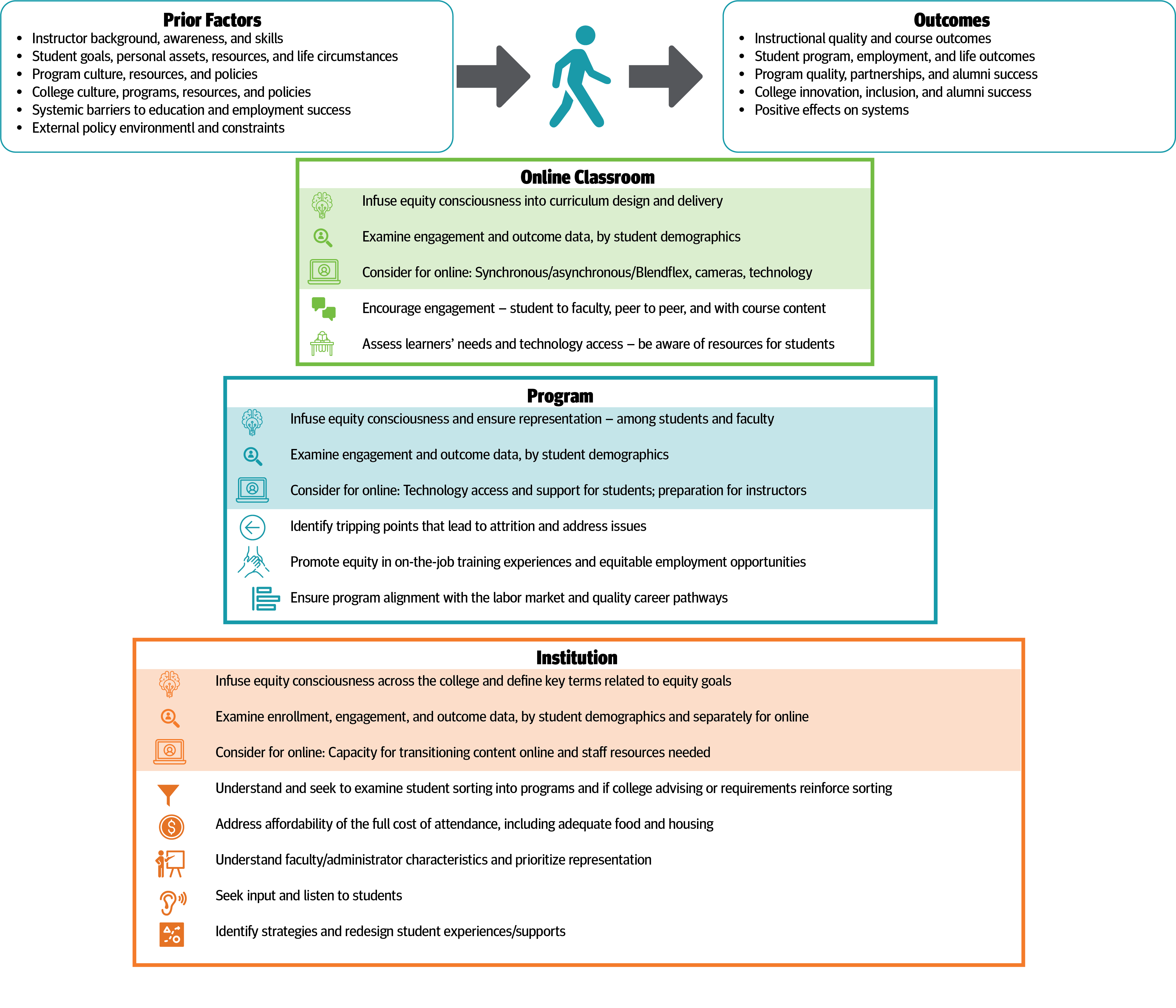Update on ECMC Foundation’s 2020 Commitment to Close Equity Gaps in Online Postsecondary Career and Technical Education (1)
December 21, 2021
By Jennifer Zeisler, Senior Program Director, Career Readiness
The COVID-19 pandemic underscored a multitude of inequities across our system of higher education, including deficiencies in online postsecondary career and technical education (CTE). With data showing that students of color and students in CTE programs have struggled with online education in the past, experts feared the all-too-necessary shift to remote learning would result in devastating outcomes for these students. That’s why we deployed a new investment initiative in fall 2020 aimed at improving online CTE at community colleges.
Essentially overnight, COVID-19 forced educators to convert their programs into viable distance learning formats. Faculty at community colleges and four-year institutions have struggled to make that transition, and less-resourced students have suffered more for it. Research shows us that online learning can widen access, but it also creates challenges for completion, especially for students of color, and that these persistent equity gaps widen without an intentional approach to reverse such trends.
For CTE students, online instruction has been on the rise since 2000, but it became the default in March 2020. From broadband and device access to digital literacy and career advising, the conversion to online learning meant that faculty and staff could no longer respond to students’ needs in the same ways. Students in these programs are more likely to be male, Black or Latinx, and older than 23, with lower incomes, holding non-work study jobs and caring for dependent children. The pandemic has only exacerbated preexisting inequities.
With the intention to improve student outcomes, reduce completion gaps and improve equity for students of color, we selected the Urban Institute (UI) last year through an open, competitive request for proposals process. UI’s CTE CoLab Coalition aims to reduce inequities in postsecondary outcomes for students of color — especially students who are Black, Latinx or Indigenous — enrolled in credit-bearing online postsecondary CTE programs (including fully online, hybrid and blended programs). The CTE CoLab Coalition is a collaboration of five other organizations: the Instructional Technology Council, the National Coalition of Advanced Technology Centers, the National Council for Workforce Education, the Office of Community College Research and Learning at the University of Illinois, and World Education.
With $2.5 million in funding from ECMC Foundation, UI and its partners are working to promote equity consciousness and action, adopt data-driven approaches, support digital skills and access, and implement other practice changes that could improve the quality of online programs. ECMC Foundation selected the CTE CoLab proposal due to its ability to respond quickly to the urgent needs of institutions while simultaneously compiling best practices, generating lessons from the colleges implementing these practices and making them available to interested institutions.
To improve student outcomes, the coalition began with a framework that takes into account prior factors — like instructors’ backgrounds and systemic barriers to student success — and research suggesting that some pandemic-related shifts may be permanent. The framework matrix below summarizes some of the current thinking in the literature and across the higher education field about how to support better outcomes for Black, Latinx and Indigenous students at the online classroom, program and institution level as it leverages a changing technological and pedagogical landscape. Employing equity consciousness into design and delivery at all levels, disaggregating and examining data and considering technology access and literacy among students, faculty, and staff alike in online learning are all necessary considerations woven into this approach. We know that fairer, more accessible opportunities in higher education for students of color are critical to achieving a truly equitable recovery from COVID-19 — and that must also extend to students seeking academic credentials awarded for the successful completion of postsecondary CTE programs.
Equity Strategies to Promote Student Success in Online Postsecondary CTE Pathways

Source: Racial and Ethnic Equity Gaps in Postsecondary Career and Technical Education. Recreated with permission from the Urban Institute.
The CTE CoLab Coalition is supporting a research-informed College Community of Practice (CCP) where participating colleges will implement action plans for improving equity. Participating community colleges are receiving coaching, technical assistance small grants, and the opportunity to learn from their peers. The participating institutions and programs are:
